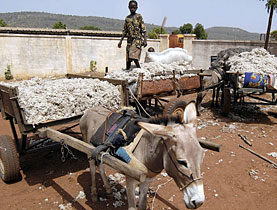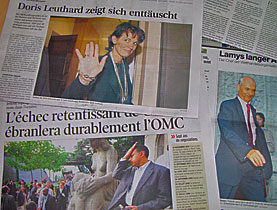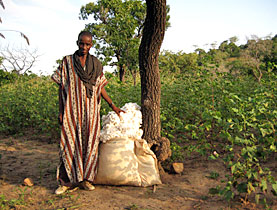Helping poor nations benefit from globalisation

The current global trading system must be revised so that developing nations no longer remain on the sidelines, a Swiss former trade negotiator tells swissinfo.
Nicolas Imboden is the driving force behind the first Geneva Trade and Development Forum, a conference dedicated to finding new ways of helping developing countries integrate into the global economy.
The forum, held in the mountain resort of Crans Montana from Wednesday until Saturday, will bring together 400 top thinkers, practitioners and decision-makers from over 40 developing and industrialised countries, including 20 ministers.
The new initiative has the support of countries including Germany, France, the Netherlands, Canada, Denmark, Sweden and Switzerland.
It is taking place as the United Nations Conference on Trade and Development (UNCTAD) meets in Geneva to review efforts to help developing countries meet the Millennium Development Goals and to examine the status of the World Trade Organization’s Doha Round talks which are currently stalled.
swissinfo: Where did the idea for the Geneva Trade and Development Forum stem from?
Nicolas Imboden: The initiative partly resulted from the Doha Round talks, which are supposed to focus on development issues and which have come to nothing.
But the main problem is not the Doha Round itself; it’s rather the international trading system, which has changed, and the institutions and negotiation mechanisms, which have failed to take this into account.
WTO trade talks take place under a mercantilist system whereby a country says, “You give me something and I give you something in return”. But a development round means a rebalancing of the trading system.
Industrialised countries created the system but developing countries are now sitting at the same table. They are therefore demanding that their needs be taken into account, but when you want a level playing field, you can’t use a quid pro quo approach.
For example, a country like Chad has nothing to offer the US in return for American concessions. The system therefore has to be revised and adapted according to the current situation.
swissinfo: How do you intend to sort out existing imbalances?
N.I.: The aim of the forum is to see how we can use trade for development purposes. Studies by the World Bank and the Carnegie Endowment for International Peace show that whatever happens during the Doha Round the only continent that won’t benefit is Africa. It’s quite incredible that the development round gives nothing to the continent that needs it most.
But this not just because the trading system works badly; it’s also because trade policies in Africa are not properly adapted to take advantage of market openings that might result from the Doha Round.
So we are looking at the role of trade policies in all development issues, so that trade really becomes a tool for fighting poverty.
That requires actions by the developing countries directly concerned, by industrialised countries, and by the private sector and international organisations.
At Crans Montana we are bringing together these four groups of stakeholders to find new ways of enabling countries to benefit from the global economy.
swissinfo: What does this mean in practical terms?
N.I.: We’ve created 11 working groups that have been spending the past year looking at 11 different themes where trade can fight poverty. These include intellectual property, employment issues, the reform calendar and the role of services.
People from governments, the private sector and from universities have drawn up concrete proposals for each of these 11 topics and at the forum we’ll be defining a road map for the coming year so they are translated into direct action.
swissinfo: How does the Geneva Trade and Development Forum differ from the WTO and the World Economic Forum in Davos?
N.I.: The fundamental difference between WTO and this forum is that at the WTO countries negotiate and defend interests and exchange concessions. We don’t want that. We want to think about how we can solve a problem.
In negotiations you always talk about what the other should do. In Crans Montana we will try to see what each country can contribute to solve the problem. It’s a very different approach.
The Davos Forum meanwhile focuses on the global economy where the big players generally define the issues. Here we want to concentrate on the problems of the poor, small countries. The perspective is very different. We want to ensure that those who haven’t benefited from globalisation can become full members of the global economy.
swissinfo-interview: Mohamed Cherif
The world has been trying to reach a new deal to expand free trade since the Doha Development Agenda was launched with great fanfare in the Qatari capital in November 2001.
But progress has been very slow and little progress has been made after almost seven years of seemingly fruitless haggling.
Discussions have foundered over the extent of cuts to farm subsidies and how far trade in services such as banking and telecoms should be liberalised.
Negotiations collapsed on July 29, 2008 over farm import rules, which allow countries to protect poor farmers by imposing a tariff on certain goods in the event of a drop in prices or a surge in imports.
India, China and the US could not agree on the tariff threshold for such an event.
Washington said that the “safeguard clause” protecting developing nations from unrestricted imports had been set too low.
On September 11 WTO chief Pascal Lamy said major economies were ready for another shot at the Doha Round negotiations to clinch an accord on freeing up global commerce.

In compliance with the JTI standards
More: SWI swissinfo.ch certified by the Journalism Trust Initiative



You can find an overview of ongoing debates with our journalists here. Please join us!
If you want to start a conversation about a topic raised in this article or want to report factual errors, email us at english@swissinfo.ch.